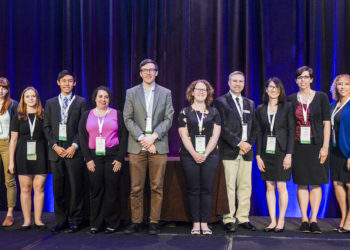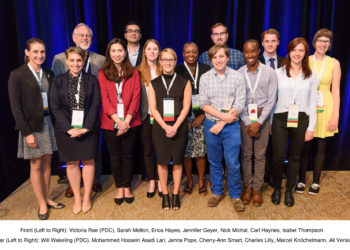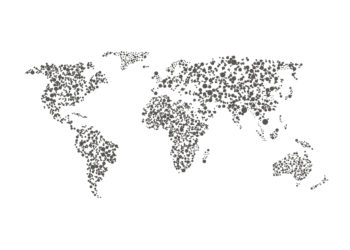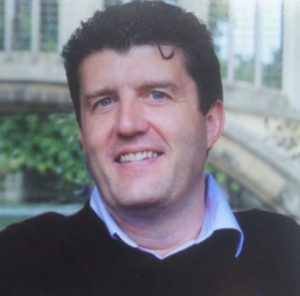
Editor’s Note: Today’s post is from Adrian Stanley, Vice President, Global Development at Digital Science, as well as the President-Elect for the Society for Scholarly Publishing (SSP); an Associate Editor for Learned Publishing; a Non-Executive Director with Bioscientifica a society-based organization that supports biomedical research, and a Board Member of STEM Fellowship. He has held numerous volunteer committee/Chair roles with SSP, ALPSP and the Council for Science Editors over the last 20+ years working within scholarly communications and academic publishing.
I wonder how many of you recall and truly appreciate the old craft days of publishing and printing — days when the making of a book was a collective work of art completed only by seasoned, well-trained professionals coming together with their unique skill sets to create a masterpiece of coordinated aesthetic delight. From the copy editors and proof readers, to the compositors, illustrators, and printers, all left their marks, in subtle detail, perfect harmony, and resting only when the smell of fresh print left the shop.
Why, might you ask, am I referring to the past and the journey of a book, when writing a post about Mentorship and Fellowship Programs at the Society for Scholarly Publishing (SSP)? Well, like the book analogy, and the journey it takes to greatness, colleagues and newer entrants into the scholarly publishing and communications world also go through their own journeys to become masters, individual works of art, (second, third and fourth editions), to develop attributes and answer their calling in this constantly changing ecosystem. With the help and support of industry members like you, and the newly launched SSP Mentorship Program, they too can learn, grow, and develop into the best and ideal versions of themselves. We find ways to assist and support them on their own career journey. I should note I’m writing this post as the SSP President-Elect, and an active member of the SSP Career Development Committee that has been entrenched in developing these programs, with an amazing team of committed volunteers.
There’s an excellent Harvard Business Review article that explains more eloquently, how some of the best mentors approach mentoring. The concept that the article’s authors Smith and Johnson put across, is that mentors should try to think like Michelangelo who ‘approached the craft of sculpting with the humble conviction that a unique and beautiful piece of art already existed within the stone, and his job was only to release it.’

I believe, just like the traditional creation of a fine book or a Michelangelo masterpiece, that we have a historic opportunity to help shape and define our community; to help our up-and-coming colleagues be the best and fullest versions of themselves via mentoring and the peer-to-peer support SSP now offers. We truly have an excellent opportunity to create a new story and narrative together, today, for the future ahead.
Now, please don’t get me wrong, mentoring is definitely not a one-way street of giving, or only for the young. Having served as a mentor for a number of years, and also having benefited from others’ wisdom, I see from all sides that the process of mentoring provides the opportunity for the mentor to openly share, support, and express their experiences in the context of the challenges their mentee faces, but to also learn and grow while doing so. In many cases the mentees and mentors receive very valuable insights and perspectives that can provide real worth and much-needed support. From my own experience as a mentor, and working with start-up companies, I know it is vital to stay in tune to what new researchers are thinking (think younger colleagues), and what new technologies are being used as a matter of course. I learned my lesson a few years back, when in an early discussion with one mentee, he said, ‘no one uses email these days to communicate in his university, between peers.’ Talk about differences between Generation X and the Millennials! From this feedback, we initiated ‘coffee time’ style, WhatsApp quick and brief mentoring sessions, along with our planned hour long catch ups.
Other benefits I have seen, from a mentor’s perspective include:, being asked to judge competitions and join advisory boards that my mentees have been associated with, has been another valuable source of learning for me. Events such as the STEM Fellowship Big Data Challenge have been not only enjoyable, but enlightening and rewarding, connecting me to key professionals outside my immediate scope and network circle. Mentoring goes way beyond the two-person relationship. In order to have a successful mentor-mentee experience, it’s equally important to reach out and connect your mentee to your own network of friends, colleagues, and peers that could also be pivotal in helping cultivate the mentee’s interests and ambitions. One thing I have always known is that people want to help but many don’t know how and just want the right opportunity. While time is precious for all of us, making connections always seems beneficial no matter the extent of the commitment, (and for the SSP program, the minimum commitment is only one hour a month). I’ve introduced mentees to colleagues at ORCID and CrossRef and those mentees have gone on to become Ambassadors in programs. Encouraging and recommending mentees for speaking and moderating opportunities within industry meetings has also been a source of paternal pride. As I see the mentees grow in confidence and experience, I am also aware of the value they bring to others with their ideas and viewpoints.
So please remember not to underestimate the value of a ‘warm’ introduction to your network of connections – or to accept that introduction from a peer to talk to their mentee.
I am very excited to be a part of SSP and get to work with our amazing volunteer committee members; especially now we have recently launched our full Mentorship Program, which follows an extensive 6-month pilot program with 40+ volunteer mentor and mentees. We have learned from the pilot how to refine the process of matching, of central support, and guidelines for the mentors and mentees to get the very best from the program. From the results of the pilot survey, and through separate discussions, we have witnessed first-hand the value and positive impact this program can have. This ranges from helping colleagues apply for internal jobs to helping people elevate their voices and opinions in meetings, or learning new industry knowledge and experience. You can find more details about the SSP Mentorship Program here. We plan to run two cohorts a year, each lasting 6 months. Our goal is to connect members who value access to a mentor with experienced colleagues and members of SSP. Applications for the first cohort have just closed, with over 70 people registering. Please know that people of all ages, career levels, and backgrounds can apply to the SSP Mentorship Program. There are many articles that recommend the benefits of mentorship programs to organizations, it’s definitely helpful for us all to have trusted mentors (formal or informal) we can turn to at all ages and stages of our careers.
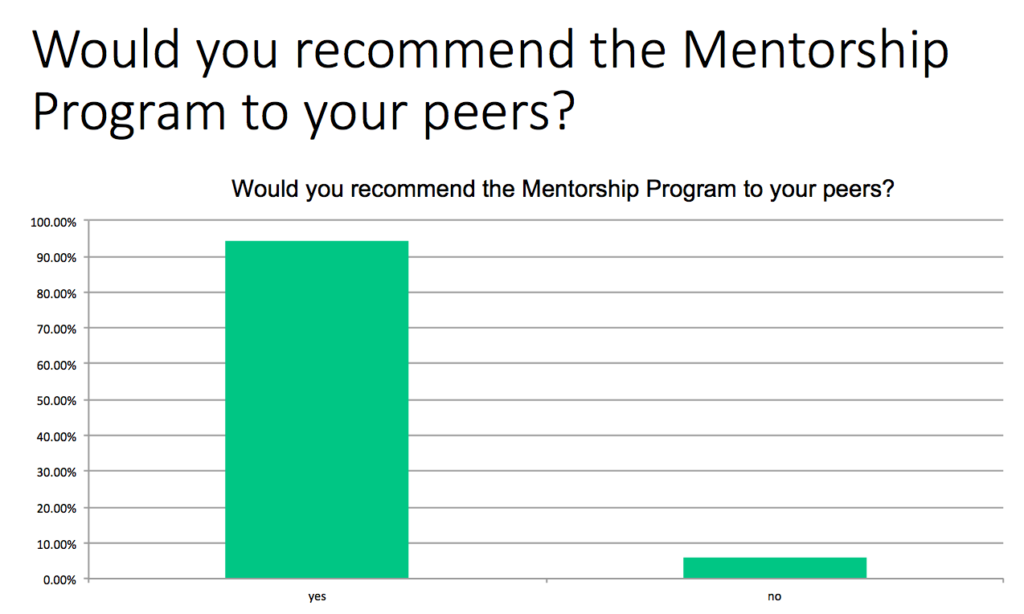
Survey results, SSP Mentorship Pilot, 94% of applicants would recommend the program to peers.
Tangential to the Mentorship Program, is the SSP Fellowship Program, which is open to early-career professionals in their first four years of work in the publishing and information profession and current students in a dedicated publishing or library and information science program. The program offers a free SSP annual membership, financial assistance to attend the SSP Annual Meeting, as well as an assigned year-long mentor. Applications are judged on the strength of answers to three key questions, with twelve winners selected. The deadline for entries is 1st March 2018.
Both of the above programs are offered at no-cost to participants, albeit the SSP Development Committee would welcome hearing from organizations who are interested in sponsoring these valuable and engaging programs.
From the SSP President-Elect’s perspective, I see these two programs noted above, as well as the development of more regional SSP meetings, the active dialogue with all industry stakeholders, and our important work on industry wide diversity task forces, as being the life-blood of having an open and actively engaged community of colleagues — sculpted in the eyes of Michelangelo himself — and creating our own, well-crafted history book that we can all be proud of.
Please do consider volunteering and signing up for these programs, and a huge hearty thanks to all the volunteers who have made these initiatives possible. And one final side note, SSP encourages and congratulates all the industry-wide mentorship programs, not just the ones noted above.
Discussion
11 Thoughts on "Guest Post: SSP Mentorship and Fellowship Programs, in the eyes of Michelangelo, and the SSP President-Elect"
Adrian, your comments echo my sentiments. Serving as a mentor is as much about sharing and teaching as it is about learning. I was priveledged to work with three mentees in two different programs over the last year and learned from them all. I urge our TSK readers to think about applying to SSP’s program which so well run by Adrian and his team.
Thanks Sue, you are an amazing example to us all … I appreciate you writing a positive comment here, and importantly being a key part of the programs … I also recall your great advice and support, in my early days volunteering on SSP committees, THANKS !
I see that SSP has a community engagement committee. I’m curious to learn of any steps taken to promote regional chapters or sections and to organize less-formal gatherings or events. While these are not as focused as one-on-one peer mentoring, I have learned a great deal from regional group networking and attending evening events.
That said, I would be willing to help organize a local working group.
Hi Jonathon, while we don’t have formal chapters, our Community Enragement Committee does indeed plan Regional Events in cities where we have concentrations of members. We have active groups in Boston, Durham, New York, Washington DC, Philadelphia, London and Berlin. Some are just getting started while others are consistently hosting two events per year that draw 40-50 attendees each. These informal, low-cost events give scholarly publishing professionals an occasion to connect with other SSP members in their local area. They offer networking opportunities and topical discussions with scholarly publishing colleagues and are ideal for early career professionals as well as those looking to expand their network.
I’ll put you in touch with the chairs of the committee (offline) to explore your interest in helping to plan SSP Regional Events in your local area. You can also learn more about our Regional Events here: https://www.sspnet.org/events/regional-events/.
Hi Adrian, At your suggestion I joined the SSP mentorship program as a mentor last year and found it to be a highly enriching experience. I encourage everyone to try it. You’ll be surprised at how much your (common) knowledge of the daily business can help someone learn the ropes and grasp the big picture. Thanks for the nudge, Adrian, and for bringing out the best in everyone you meet.
Hi Adrian,
thank you for emphasizing the role of active listening in mentor-mentee relationships. As a mentee from 2017 SSP Cohort, I must admit it was the key factor of success, next to the perfect match, and the lesson for the whole life.
Based on your experience with startups, How would you describe the difference between advisor and mentor besides official agreement?
Bests, Roman
Hi Roman, thanks for the welcome comment, I’m very pleased you saw real benefit in the first SSP mentoring cohort … I hope you’ll continue to spread the word and be involved, share your experiences.
In answer to your question, in my own opinion in this SSP context, the term Advisor, is someone who possess relevant skills that your start-up company needs to grow or achieve certain bsiness goals, often skills or experience the new start-up does not have, or doesn’t have the time to develop organically. The role of the professional Advisor is often carried out with joint agreement the Advisor something in return for their advice as and when the business grows and evolves. Mentors, and mentoring in the context of the SSP program, is really more on an individual and not company/corporate level, and is there to support the needs of the individual (in and out of work), on a volunteer, peer to peer basis.
Is that how you have experienced the differences? or do you have another perspective that it would be useful to share here ? no doubt there’s some overlap if you are working with a really good Advisor, or Mentor.
I also feel that Mentorship is a (i) free-will sharing of deep insights which is (ii) expressed in a language clear to recipient. So that Mentee will modify his/her behavior to achieve ultimate results.
One of the biggest questions I’ve asked myself during SSP program: “But what I can give in return?” There is still no answer, how to gratitude Mentor that helped to make a huge step in mastering your life.
Adrian, what do you think, would it be correct to summarize the difference in the next formula:
Advisor = Mentor + Official Status + Material Benefits
?
A fantastic post, Adrian, and I love the Michelangelo analogy! The advice and support I’ve had from my amazing mentors has been, I believe, the biggest factor in growing both my experience and confidence over the last few years. On top of that, they’ve also introduced me to all sorts of brilliant people who have had an impact on my career, and have helped me get involved in industry events that I don’t think I would have been able to do otherwise.
I can’t get enough mentorship now – but it was the SSP Fellowship Program that first showed me the incredible value of it, and I couldn’t recommend the Program highly enough to anyone thinking of applying. I’m excited to see the growth of the dedicated Mentorship program next.
The only other big benefit that you didn’t specifically mention is the friendship that comes along with it – alongside all the professional advantages and enrichment, my mentors have also become great friends!
As it happens, I’ve been lucky enough to have Adrian as a mentor and friend over the last few years. Mentorship can happen naturally, and I don’t think we’ve actually ever used the words ‘mentor’ or ‘mentee’ specifically when chatting, but it’s clearly mentorship nonetheless!
Thanks Isabel … and thanks for the comment and pick-up addition on the importance of friendships made too while mentoring … very true, many life long acquaintances have been made through volunteering on committees with SSP and the likes … and to be fair, the success and wonderful examples we had with the SSP Fellows and their mentor/mentees, really empowered us/SSP to start the mentorship pilot … so to all the Fellows (and mentors), thanks for being a great catalyst to what we have now !
As a colleague and friend I am so thrilled to see this post by Adrian and can personally attest to the benefits of the SSP mentorship program. Encouraged by Adrian I signed up to be a part of the SSP mentorship pilot which took place last year and was very pleased with the entire program. It gave me just what I needed in terms of mentorship and I would not be doing certain things today had it not been for this program. Considering this I think mentorship and career development are a fantastic focus for SSP. As the industry landscape changes it is going to take all of us, early, middle, and late career, to continue to innovate and exchange ideas for the benefit of Science.
